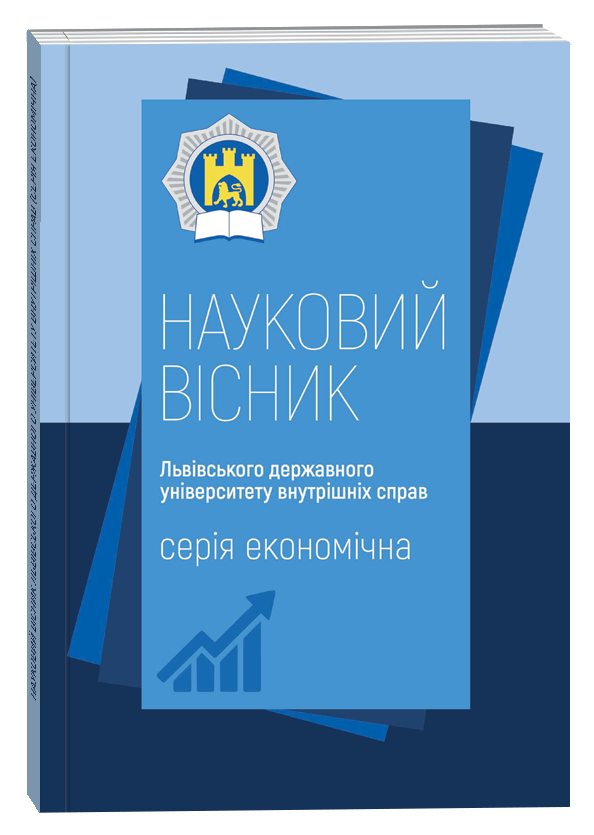СУТНІСТЬ ФІНАНСОВОГО МОНІТОРИНГУ В СИСТЕМІ ЗАБЕЗПЕЧЕННЯ ЕКОНОМІЧНОЇ БЕЗПЕКИ
DOI:
https://doi.org/10.32782/2311-844X/2023-2-3Ключові слова:
фінанси, моніторинг, фінансовий моніторинг, економічна безпека, підприємство, загрозиАнотація
Метою статті є дослідження особливостей фінансового моніторингу в системі забезпечення економічної безпеки. Доведено, що фінансовий моніторинг допомагає ідентифікувати підозрілі фінансові операції, що можуть бути пов’язані з відмиванням грошей, фінансуванням тероризму, або іншими незаконними діями. У дослідженні для вивчення особливостей системи фінансового моніторингу в умовах забезпечення економічної безпеки, використано загальнонаукові методи дослідження, а саме метод теоретичного та порівняльного аналізу, індукції та дедукції та графічний метод. Встановлено, що фінансовий моніторинг є важливим інструментом, за допомогою якого стає можливим найбільш якісно проводити оцінку результатів діяльності суб'єктів господарювання та обґрунтовано приймати дієві управлінські рішення в системі забезпечення економічної безпеки. Обґрунтовано, що основним завданням фінансового моніторингу є послідовний контроль відхилення фінансового становища підприємства від нормативного. Для цього необхідно правильно відбирати оціночні критерії фінансового стану підприємства, об'єктивно визначати та встановлювати їх нормативні значення. Якщо показники виявляться не оптимальними та надуманими, то й рівень економічної безпеки знижиться. Сформовано ієрархію системи фінансового моніторингу в контексті забезпечення економічної безпеки. З’ясовано, що фінансовий моніторинг являє собою організовану та постійно діючою систему необхідної статистичної звітності, збирання та аналізу соціально-економічної інформації, додаткових аналітичних оглядів, діагностики стану тенденцій розвитку та аналізу конкретних проблем щодо забезпечення економічної безпеки. Сформовано модель сутності фінансового моніторингу в системі економічної безпеки підприємства. Доведено, що ефективний фінансовий моніторинг допомагає державі підтримувати добру міжнародну репутацію у сфері фінансової прозорості та боротьби з корупцією.
Посилання
Sūdžius V. (2007). Speciality of decision making choice in retail market of finance services. Business: Theory and Practice, no. 8(2), pp. 107–111. DOI: https://doi.org/10.3846/btp.2007.16
Frolova L., Zhadko K., Ilyash O., Yermak S. & Nosova T. (2021) Model for opportunities assessment to increase the enterprise innovation activity. Business: Theory and Practice, no. 22(1), pp. 1–11. DOI: https://doi.org/10.3846/btp.2021.13273
Ilyash O., Lupak R., Kravchenko M., Trofymenko O., Duliaba N. & Dzhadan I. (2022) A forecasting model for assessing the influence of the components of technological growth on economic security. Business: Theory and Practice, no. 23(1), pp. 175–186. DOI: https://doi.org/10.3846/btp.2022.15298
Sylkin O., Kryshtanovych M., Zachepa A., Bilous S. & Krasko A. (2019) Modeling the process of applying anti-crisis management in the system of ensuring financial security of the enterprise. Business: Theory and Practice, no. 20, pp. 446–455. DOI: https://doi.org/10.3846/btp.2019.41
Blakyta G., Guliaieva N., Vavdijchyk I., Matusova O. & Kasianova A. (2018) Evaluation of investment environment security in Ukraine. Investment Management and Financial Innovations, no. 15(4), pp. 320–331. DOI: https://doi.org/10.21511/imfi.15(4).2018.26
Sylkin O., Shtangret A., Ogirko O., Melnikov A. (2018) Assessing the financial security of the engineering enterprises as preconditions of application of anti-crisis management: practical aspect. Business and Economic Horizons, no. 14 (4), pp. 926–940. DOI: https://doi.org/10.15208/beh.2018.63
Dokiienko L. (2021) Financial security of the enterprise: An alternative approach to evaluation and management. Business, Management and Economics Engineering, no. 19(2), pp. 303–336. DOI: https://doi.org/10.3846/bmee.2021.14255
Shtangret A., Topalova E., Polovcev O., Chornenka O. & Musiyovskyi A. (2021) Practical aspects of the use of antisipative management in the process of ensuring the economic security of an enterprise. Business: Theory and Practice, no. 22(1), pp. 202–210. DOI: https://doi.org/10.3846/btp.2021.13556
Rushchyshyn N., Medynska T., Nikonenko U., Kostak Z. & Ivanova R. (2021) Regulatory and legal component in ensuring state’s financial security. Business: Theory and Practice, no. 22(2), pp. 232–240. DOI: https://doi.org/10.3846/btp.2021.13580
Bilan Y., Vasilyeva T., Lyeonov S. & Bagmet K. (2019) Institutional complementarity for social and economic development. Business: Theory and Practice, no. 20, pp. 103–115. DOI: https://doi.org/10.3846/btp.2019.10
Zhyvko Z., Gorban I., Marushko N., Korzh M. & Korogod N. (2021) Human Capital Management Under the Conditions of the Postmodern Society in the Context of Ensuring the Economic Safety of the Enterprise. Postmodern Openings, no. 12(1), pp. 267–283. DOI: https://doi.org/10.18662/po/12.1/259
Kolisnichenko R., Tsumariev M., Melnyk N., Gorban I. & Marushko N. (2022) Philosophical and Legal Essence of Control in Terms of Ensuring National Security. WISDOM, no. 23(3), pp. 254–261. DOI: https://doi.org/10.24234/wisdom.v23i3.832





